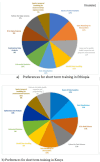A collaborative approach to advancing research and training in Public Health Data Science-challenges, opportunities, and lessons learnt
- PMID: 39722718
- PMCID: PMC11668772
- DOI: 10.3389/fpubh.2024.1474947
A collaborative approach to advancing research and training in Public Health Data Science-challenges, opportunities, and lessons learnt
Abstract
The unprecedented availability of increasingly complex, voluminous, and multi-dimensional data as well as the emergence of data science as an evolving field provide ideal opportunities to address the multi-faceted public health challenges faced by low and middle income countries (LMIC), especially those in sub-Saharan Africa. However, there is a severe lack of well-trained data scientists and home-grown educational programs to enable context-specific training. The lack of human capacity and resources for public health data analysis as well as the dire need to use modern technology for better understanding and possible intervention cannot be dealt with currently available educational programs and computing infrastructure, demanding a great deal of collaboration and investments within Africa and with the Global North This paper describes processes undertaken to establish sustainable research training programs and to train a new generation of data scientists with knowledge, mentoring, professional skills, and research immersion. The goal is to position them for rigorous, biomedically grounded and ethically conscious Public Health Data Science practice with a focus on Ethiopia and Kenya. The programs are realized through partnership among Columbia University (CU, USA), Addis Ababa University (AAU, Ethiopia), and the University of Nairobi (UoN, Kenya). In this paper, we describe the collaborative project named "Advancing Public Health Research in Eastern Africa through Data Science Training (APHREA-DST)" delving on its conceptualization, implementation framework and activities undertaken. We adopted both qualitative and quantitative approaches to understand the needs of the stakeholders for such educational and training programs. Through harmonized online surveys and stakeholder engagements via focus group discussions in Ethiopia and Kenya, a curriculum was developed for a masters degree program in Public Health Data Science (PHDS). Moreover, the engagement with local projects in both countries as well as active collaboration with other data science related projects in Africa under DSI-Africa consortium benefited the project to start the M. Sc. program successfully. So far, the launching of the graduate program in both countries and the two-cycle experience sharing program done at Columbia University as well as the numerous MoUs signed between partners for data sharing and internships are the major successes of the project. In this paper, we discuss in detail the challenges faced as well as the existing opportunities and lessons learnt this far in implementing this tripartite collaborative teaching and research project.
Keywords: APHREA-DST; DSI-Africa; data science; faculty development; public health.
Copyright © 2024 Abade, Mulugeta, Orowe, Hailemariam, Weke, Bekele, Zaugg, Goldsmith, Sanchez and Berhane.
Conflict of interest statement
The authors declare that the research was conducted in the absence of any commercial or financial relationships that could be construed as a potential conflict of interest.
Figures






Similar articles
-
Health professionals' experience of teamwork education in acute hospital settings: a systematic review of qualitative literature.JBI Database System Rev Implement Rep. 2016 Apr;14(4):96-137. doi: 10.11124/JBISRIR-2016-1843. JBI Database System Rev Implement Rep. 2016. PMID: 27532314
-
Effects of consumers and health providers working in partnership on health services planning, delivery and evaluation.Cochrane Database Syst Rev. 2021 Sep 15;9(9):CD013373. doi: 10.1002/14651858.CD013373.pub2. Cochrane Database Syst Rev. 2021. PMID: 34523117 Free PMC article.
-
Home treatment for mental health problems: a systematic review.Health Technol Assess. 2001;5(15):1-139. doi: 10.3310/hta5150. Health Technol Assess. 2001. PMID: 11532236
-
Participation in environmental enhancement and conservation activities for health and well-being in adults: a review of quantitative and qualitative evidence.Cochrane Database Syst Rev. 2016 May 21;2016(5):CD010351. doi: 10.1002/14651858.CD010351.pub2. Cochrane Database Syst Rev. 2016. PMID: 27207731 Free PMC article.
-
Hail Lifestyle Medicine consensus position statement as a medical specialty: Middle Eastern perspective.Front Public Health. 2025 Jun 20;13:1455871. doi: 10.3389/fpubh.2025.1455871. eCollection 2025. Front Public Health. 2025. PMID: 40620567 Free PMC article.
References
-
- Marivate V, Moorosi N. Exploring data science for public good in South Africa: evaluating factors that lead to success. In: 19th Annual International Conference on Digital Government Research, May 30 - June 1, 2018. Delft: (2018).
-
- Nicholas M, Heather M, Latifa J, Zainab S, Rumi C. Data science in public health: building next generation capacity. Harv Data Sci Rev. (2022) 4:4. 10.1162/99608f92.18da72db - DOI
-
- World Health Organization . A Heavy Burden: the Productivity Cost of Illness in Africa. Brazzaville: WHO Regional Office for Africa; (2019).
MeSH terms
Grants and funding
LinkOut - more resources
Full Text Sources

